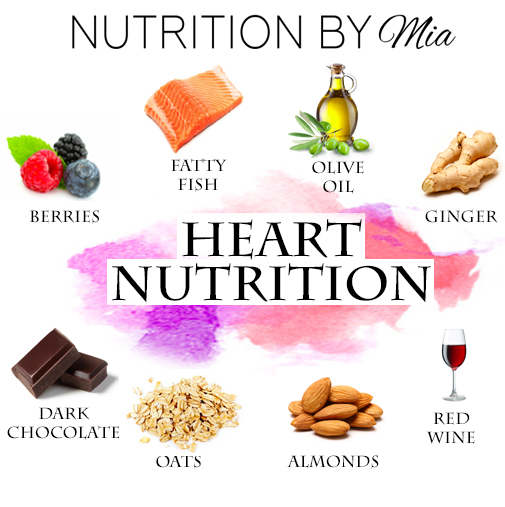Now that we are officially a week away from Valentine’s Day, I’ve decided to touch upon one of my favorite fields of nutrition- the link between diet and heart health. 82% of coronary heart disease is attributed to lifestyle: diet, physical activity, and smoking. With those kind of odds, it’s inspiring to know how much of an impact you can have on your own health just by making the right choices starting with diet and exercise.
Research shows that even little choices like choosing the right healthy snack can impact cardiovascular health. Snacks rich in polyunsaturated fats and low in saturated fats leads to greater improvements in cardiovascular disease factors.
American Heart Association Diet and Lifestyle Recommendations:
The American Heart Association has established recommendations backed by evidence-based research and clinical trials showing what habits produce the lowest risk of heart disease. These recommendations include the following:
- Maintaining a healthy body weight
- Consuming a diet rich in fruits and vegetables
- Choosing whole grains and high fiber foods
- Consuming fatty fish at least 2 times per week (salmon, mackerel, sardines, etc.)
- Limiting intake of saturated fat and cholesterol. Avoiding trans fats at all costs
- Minimizing intake of added sugars
- Limiting salt consumption
- Consuming alcohol in moderation
What’s the deal with dietary fat?
Even though it’s 2016, dietary fat still gets demonized on occasion as if we were stuck in the 90’s- but it really shouldn’t be! What matters most is the type (quality) of dietary fat you are consuming rather than the quantity. Low-fat diets reduce cholesterol but raise triglycerides and the number of small, dense LDL particles (“bad” cholesterol). Unsatuated fats (healthy fats) reduce cholesterol without raising triglyerides compared to saturated fat.
Foods and Nutrients for Heart Health:
Soluble fiber: Beta-glucan soluble fiber from oat bran, rolled oats and whole oat flour have suggested heart-health benefits. This can also be found in psyllium husk, barley, pectin and guar (fruit). This viscous, fermentable fiber has shown to reduce risk of coronary heart disease, stroke, hyprtension, diabetes, obesity and some GI disorders.
Soy protein: Soy protein works by up-regulating LDL receptor activity (LDL is our “bad” cholesterol) which results in reduced circulating LDL cholesterol in our blood stream.
Nuts: Scientific research suggests that eating 1.5 ounces per day of most nuts (almonds, hazelnuts, pecans, pistachios, walnuts) as part of a diet low in saturated fat and cholesterol may reduce the risk of heart diease. High nut consumption is associated with reduced risk of cardiovascular disease, lower levels of inflammatory markers, as well as reduced LDL cholesterol and triglycerides in the bloodstream.
Healthy fats (unsaturated, omega 3s): research suggests that consumption of omega-3 fatty acids may reduce the risk of coronary heart diease. Omega-3s have been shown to reduce arrhythmias, be mildly hypotensive and retard growth of atherosclerotic plaque.
Don’t forget to follow me on Facebook and Instagram to keep up with my recipes, nutrition tips, entertaining ideas and collaborations! You can also find my new app in the Apple Store!!













